Ethical hacking, also known as penetration testing or white-hat hacking, involves legally breaking into computers and devices to test an organization’s defenses. Unlike malicious hackers, ethical hackers seek to identify vulnerabilities to enhance security rather than exploit them for personal gain.
Importance of Ethical Hacking
In today’s interconnected world, cybersecurity is paramount. Ethical hacking plays a crucial role in identifying and patching vulnerabilities, ultimately safeguarding sensitive data and systems from cyber threats.
Table of Contents
Benefits of Learning Ethical Hacking
Learning ethical hacking empowers individuals and organizations to proactively detect and mitigate security risks. By understanding how hackers operate, professionals can better defend against cyber-attacks, making systems more resilient.
Career Opportunities
Ethical hacking skills are in high demand across various industries. Certified ethical hackers can pursue lucrative careers as security analysts, penetration testers, or cybersecurity consultants, enjoying both financial rewards and job satisfaction.
Criteria for Selecting Learning Platforms
The learning platform should offer comprehensive and up-to-date content covering various aspects of ethical hacking, including network security, web application security, and cryptography.
Interactive Learning Experience
Interactive labs, real-world simulations, and hands-on exercises are essential for effective learning. Platforms that provide practical experience in simulated environments help learners grasp concepts more effectively.
Certification and Recognition
Look for platforms that offer recognized certifications such as Certified Ethical Hacker (CEH) or Offensive Security Certified Professional (OSCP). These credentials validate your skills and enhance your credibility in the industry.
Top 9 Platforms for Learning Ethical Hacking
1. Cybrary
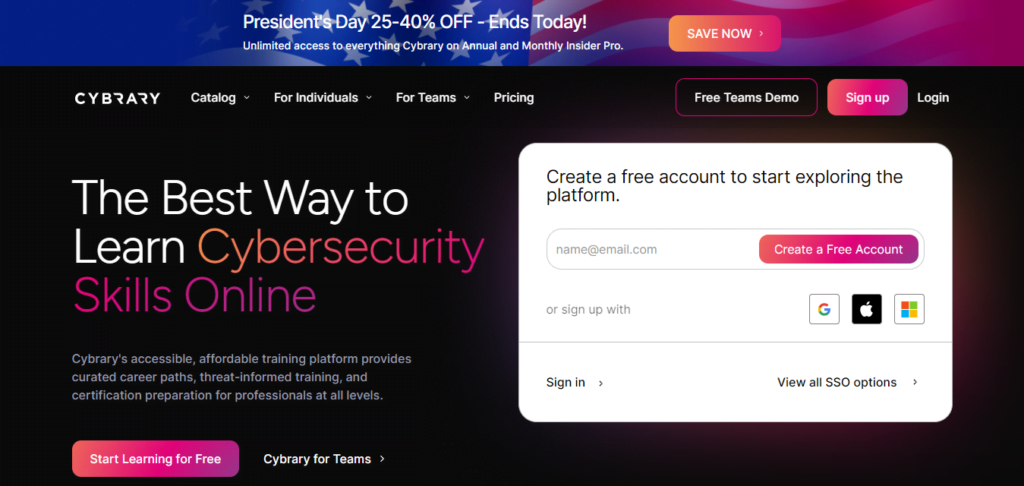
Cybrary is a completely FREE online cybersecurity training website. Here you can Learn, contribute and join the only free and open source ethical hacking training community online. It provides training for most complicated topics of the IT sector. It is supported by a community of people to provide free up-to-date lessons and learning materials. Cybrary also provides the chance to connect with businesses in the ITsec industry.
Start Learning for free on Cybrary
2. Hack This Site
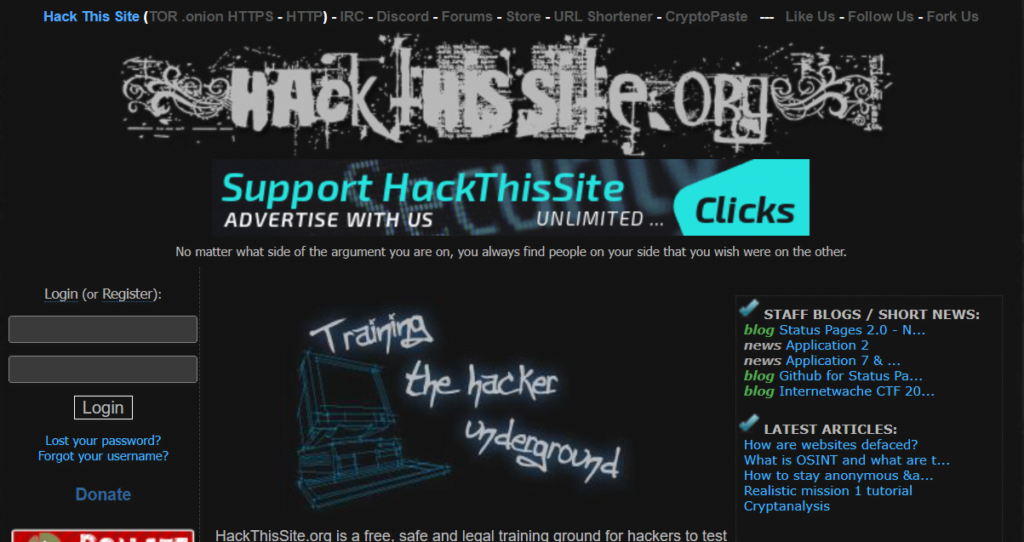
Hack This Site is a free, safe and legal training platform for hackers to test their hacking skills. The website has a vast selection of hacking articles. It also has a huge forum where users can discuss hacking and security. It’s an active community with many active projects in development. You’ll find a lot of new challenges and missions on the homepage including:
- Basic missions
- Realistic missions
- Application missions
- Programming missions
- Javascript missions
- Forensic missions
- Extbasic missions
- Stego missions
Start Learning on Hack This Site
Dive Deeper in Hacking! Learn About Flipper Zero & The M1 Device, Most Advance Hacking Tools.
3. Offensive Security (also known as OffSec)
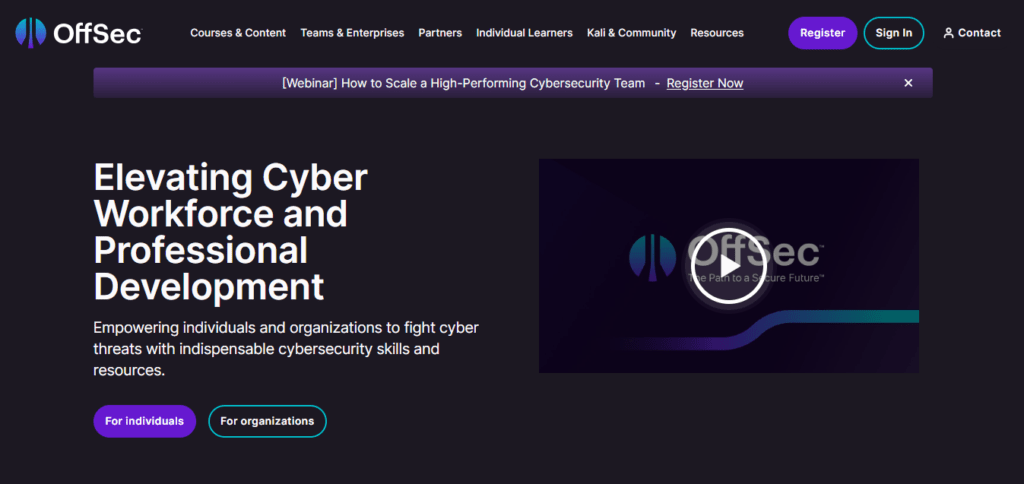
Offensive Security is one of the most recommended websites to learn ethical hacking. The website provides various online courses, live courses, and in-house training programs. You can become a certified ethical hacker by participating in their certification exams such as OSCP, OSWP, OSCE, and OSEE. Here are the main services provided on this website:
- Security Training and Certification
- Penetration Testing Virtual Labs
- Penetration Testing Solutions
- Community Projects
Start Learning on Offensive Security
4. Security Tube
SecurityTube is one of the world’s largest portals catering to pen-testing and security research training. SecurityTube is branded as the YouTube for ethical hacking and information security. The website features many important security courses containing everything from basic to advance. The website is a collection of many courses created by experienced security researchers. It has hundreds of hours of security, vulnerability, and hacking related content.
5. HackADay
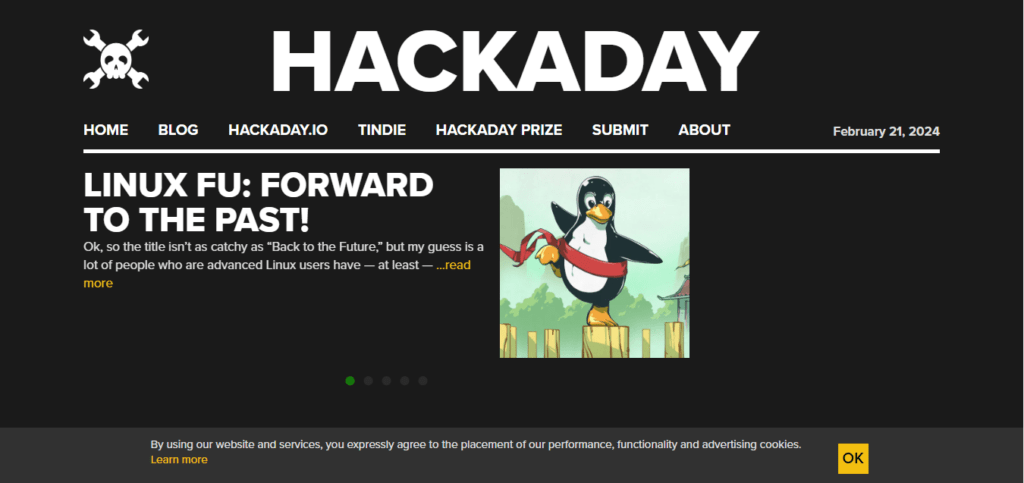
Hackaday is a blog which publishes daily articles about hardware and software hacking. Hack a day also has a YouTube channel where it posts projects and how-to videos. It provides mixed content like hardware hacking, signals, networking, and cryptography. Hackaday is the best blog for security researchers and computer science students to enhance their knowledge. It also features several projects and competitions.
6. Udemy

Udemy provides online video courses for ethical hacking and penetration testing. Major courses include basic stuff like installing Kali Linux, using VirtualBox, basics of Linux. Deep knowledge of Tor, Proxychains, VPN, Macchanger, Nmap. Live training of cracking wifi using aircrack, DoS attacks, SLL strip, known vulnerabilities, SQL injections, cracking Linux passwords, and many more topics. When you buy any course, you can ask your questions directly to the instructor and the community built around it.
7. Hacking-Tutorial

Hacking-Tutorial website is a collection of hundreds of tutorials on ethical hacking and cybersecurity. It also provides latest hacking news, tools, and ebooks. You can learn how to hack a computer and various attacks. You can also learn about programming related hacking tasks like how to make a Python host, code your first SQL injection etc.
Start Learning on Hacking-Tutorial
8. EC-Council
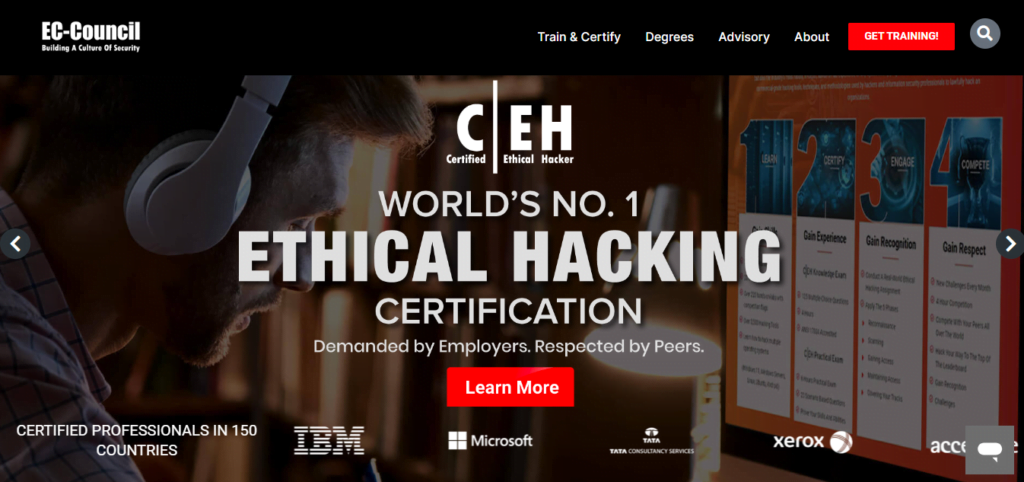
The EC-Council offers numerous certifications in a variety of fields related to IT security. The certifications include disaster recovery, secure programming, e-Business and general IT security knowledge. The website provides you all kinds of courses and tools that make you a certified ethical hacker. Its best-known certification is the Certified Ethical Hacker (CEH) which provides complete ethical hacking and network security training.
Here are some of the certifications provided by EC-Council:
- Certified Ethical Hacker (CEH)
- EC-Council Certified Computer Investigator (ECCI)
- Computer Hacking Forensic Investigator (CHFI)
- EC-Council Certified Security Analyst (ECSA)
- Certified Secure Computer User (CSCU)
- EC-Council Network Security Administrator (ENSA)
- Licensed Penetration Tester (LPT)
9. SecTools
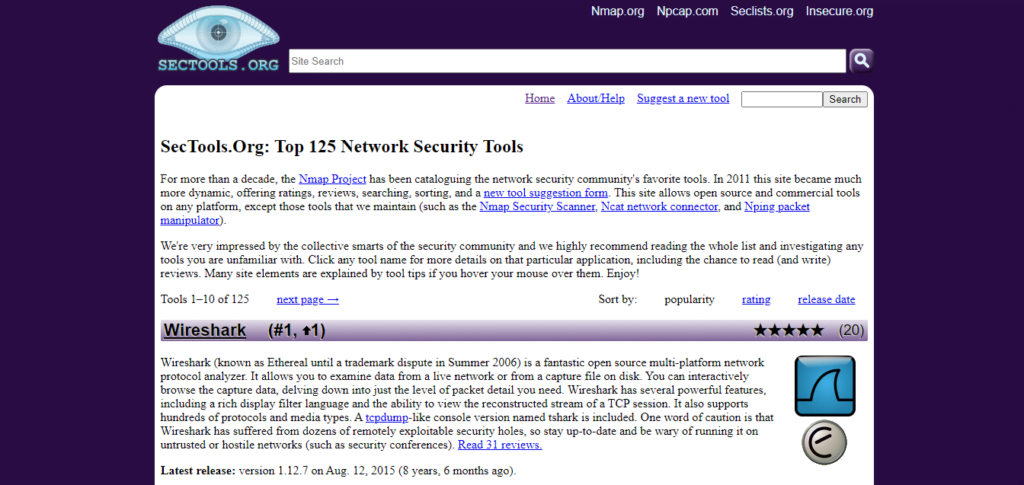
SecTools is one of the best websites that deal with network security. There are many security tools contained in this site. This site has got a list of tricks which are specific to the network security that is against the threat associated with network security. You can also find details about each security tool.
Comparison of Platforms
While some platforms offer free courses or trials, others require a subscription or one-time payment. Consider your budget and the value provided by each platform before making a decision.
Instructor Expertise
Research the qualifications and experience of instructors on each platform. Choose courses taught by industry professionals with practical experience in ethical hacking and cybersecurity.
Conclusion
In conclusion, learning ethical hacking is not only essential for enhancing cyber security but also opens up lucrative career opportunities in the field of cybersecurity. By selecting the right learning platform and acquiring relevant certifications, individuals can develop the skills needed to safeguard digital assets and combat cyber threats effectively.
FAQs About Ethical Hacking and Cybersecurity
Q1: Is ethical hacking legal?
A1: Yes, ethical hacking, when conducted with proper authorization, is legal and plays a vital role in strengthening cybersecurity defenses.
Q2: What skills are required to become an ethical hacker?
A2: Ethical hackers should possess strong problem-solving skills, knowledge of programming languages, understanding of network protocols, and a passion for learning about new security technologies.
Q3: Can I learn ethical hacking without a technical background?
A3: While a technical background can be beneficial, many learning platforms offer beginner-friendly courses that cover the fundamentals of ethical hacking.
Q4: How long does it take to learn ethical hacking?
A4: The time it takes to learn ethical hacking varies depending on your existing knowledge and the depth of study. With dedication and consistent practice, you can acquire basic skills in a few months.
Q5: Are certifications necessary for a career in ethical hacking?
A5: While certifications are not mandatory, they can enhance your credibility and demonstrate your expertise to potential employers. Certifications such as CEH, OSCP, and CISSP are highly valued in the cybersecurity industry.



